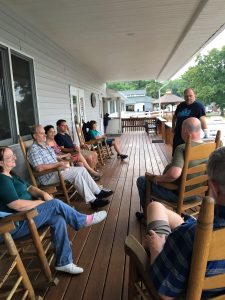We have seen that King David finishes this song of ascent to Jerusalem with a prayer for that earthly city, God’s city and his city during old covenant times. It was a city set apart to the Lord for his worship and the good of his people. Next, David provides two reasons for praying for the peace of Jerusalem.
First, the peace of Jerusalem would be for the benefit of his family and friends. This definitely puts the request in personal terms. Every normal person cares for their family. The bonds of blood relationship knit hearts together in love. Distance, work, and the cares of life might dull the closeness that we ought to feel. But the familial relationship remains. Think of how the Covid-19 crisis has brought families together, perhaps for some only out of necessity, but it has given families the opportunity to care for each other in ways that might not have happened for years. (Sadly for some, it has only been a reason to neglect their family more. Tragic!) By the way, if you feel badly over long neglect or think ill about someone in your family, do not beat each other up with accusations and guilt. Instead, please rejoice in this opportunity and thank God for bringing honey out of the lion’s mouth (cf. Judges 14:8-9). It is an opportunity for your family to forge deeper ties of love.
We also care for our friends. Hopefully, you have many friends. Friendship always carries with it the risks of disappointment, shared troubles, differences of opinions, and even betrayal. But friends realize that sharing love, joy, and peace with others is worth such risk. We want our friends to live in peace and to prosper. King David knew that the strength of Jerusalem would provide security for his friends. At this current hour, we pray for the Covid-19 pandemic to end and for a resurgence of the economy. Those blessings would be for the benefit of our families and friends. For David, the peace of Jerusalem was their need.
Second, the peace of Jerusalem would be for the benefit of the Lord’s house, the temple that would be built by Solomon. By faith, David saw the future of the worship. It would be centered on a beautiful temple. Having this vision, David worked hard and gave generously for its construction, though he would never see it. In order for the temple to come into existence and to continue as the place for worship, the peace of Jerusalem was necessary. Sadly, that magnificent house for God was only to last for four hundred years. The Chaldeans destroyed it at God’s will, because of Israel’s rebellion against the Lord and his law covenant. Prayer is part of our spiritual armor to protect us from temptation and sin (Ephesians 6:18).
We ought to pray for the peace of the new covenant temple, the church, Christ’s new assembly of believers. Wicked men and women hate God and his people. They scheme and work for the church’s downfall at this hour, or at least to cause it hardship, as we have seen in various places during this pandemic. When we communicate with God about the needs of his people, he acts for our good. Please pray for your local gathering of followers of Christ. Our safety is not found in our power and wisdom, but in the Lord’s. Jesus Christ himself is our peace (Ephesians 2:14).
Grace and peace
David

 1 Timothy 5:1-2
1 Timothy 5:1-2 1 Timothy 3:14-15
1 Timothy 3:14-15

